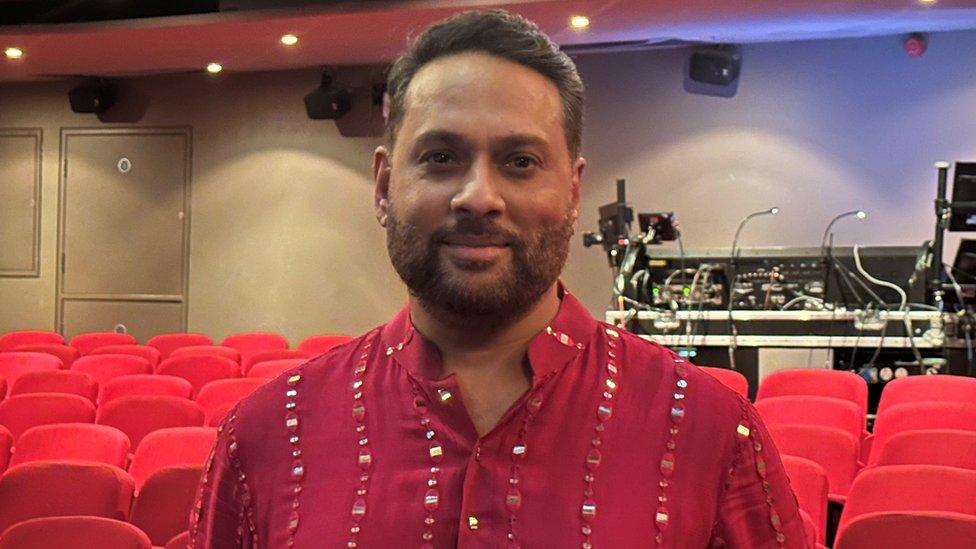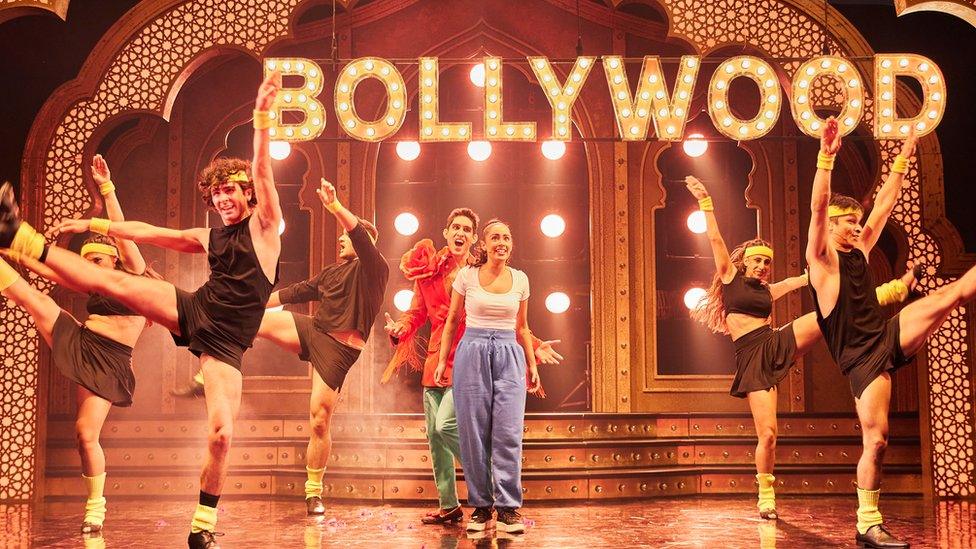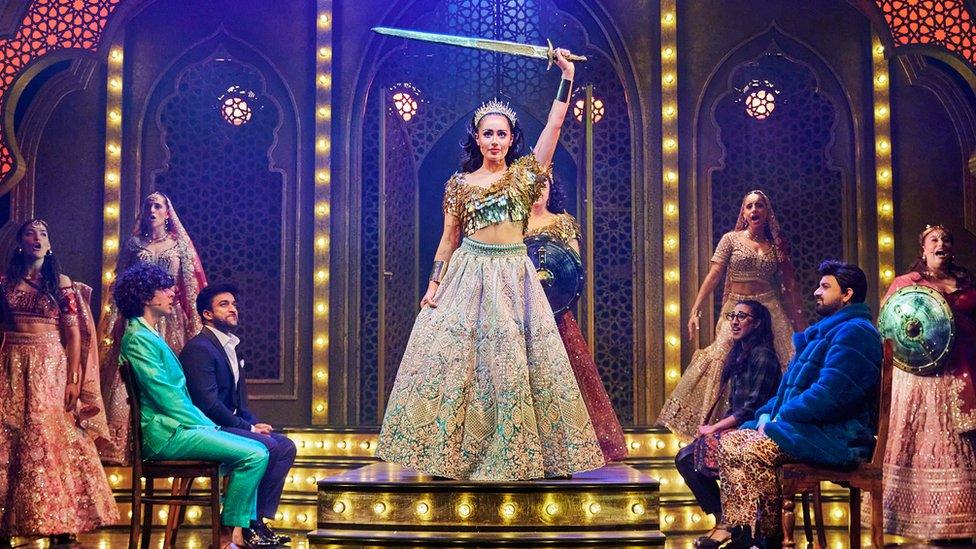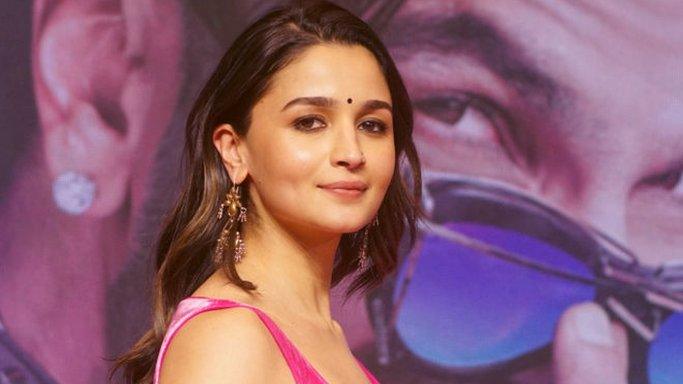Pravesh Kumar: Film-maker says he wants to change 'sexist' Bollywood
- Published

Theatre and film director Pravesh Kumar's new musical asks difficult questions about India's film industry
Bollywood is adored globally, but it has also faced criticism for being sexist and misogynistic.
That's something film and theatre maker Pravesh Kumar wants to change.
Kumar, who was born in Slough but spent a decade working in Bollywood, told BBC News he is using his new musical, Frankie Goes To Bollywood, as a way to shine a light on the Indian film industry's darker side.
"I think it's important to ask the really important questions," he said.
The problems of sexism and gender inequality run far deeper than just India.
Hollywood was at the centre of the #MeToo movement, which was sparked by allegations against Harvey Weinstein in 2017.
The disgraced film producer is facing a new trial in the autumn after his state rape conviction was overturned, a judge ruled last week.
"It's not just Bollywood, we know it's Hollywood too, this is just the story we're telling," British Asian actress Laila Zaidi told BBC News.

A new musical depicts the darker side of Bollywood
The musical is told through the eyes of a young actress from Milton Keynes who moves to India seeking stardom.
But once there, Frankie quickly becomes disenchanted by the industry. She is objectified and preyed on by men double her age. Older female actresses are cast aside, although older male actors are celebrated. Nepo-babies get ahead quicker and win awards.
The show is based on true stories.
Kumar worked for various big film houses and television production companies in India as an assistant director and writer.
He said he always loved the films growing up, but as he became older, became increasingly uncomfortable about what he was seeing on screen.
"You regularly see scenes where a 50- or 60-year-old man is romancing a girl less than half his age. And we're all complicit in that if we buy that ticket."
He described the industry as "absolutely still sexist," adding: "Bollywood cinema is still run by men, and it's for men."
Kumar says he wanted to depict these themes in his musical, to draw attention to them and drive change.
He also consciously portrayed a strong female character, in the protagonist Frankie, as part of the musical's message of female empowerment.
"I didn't want to make a fluffy Bollywood dance show," he said. "All I can do, as an artist, is ask important questions. And if it is difficult, when you go back home, I want you to have a conversation about it because that's how change happens."
The musical has been well received by critics, with the Stage calling it "witty and knowing" and awarding it three stars, external.
The Salterton Arts Review, external, meanwhile, said it showcased "all the best bits of Bollywood while calling for the problematic bits to change".
'Sexist and regressive'
Bollywood produces hundreds of films every year and has a huge following among Indians globally.
But many of its movies have been criticised for being regressive, and for portraying women in a negative and misogynistic way.
One recent film, 2023's Animal, faced a backlash from some critics, including in India. Scenes such as the one in which a female character is asked to lick a man's boots, and others portraying domestic and sexual abuse, sparked controversy. Despite this, it was a box office hit.
Last year, a study revealed just how little gender equality there was in Bollywood - both on and off screen.
Researchers from Tiss (Tata Institute of Social Sciences) in Mumbai concluded that though women-centric films give some reason for optimism, the box-office hits continue to be sexist and regressive and women and queer representation remains abysmal in them.
Anupama Chopra, a film critic and Editor of Film Companion, based in Mumbai, said Bollywood is still sexist "but so is every film industry in the world".
But she said change is happening, driven in part by the MeToo movement which took off in 2017.
"Absolutely there is much more awareness and many more women in positions of power. So there is change. It's slow but it's definitely there."
Nandini Ramnath, a film critic at Scroll.in, also based in Mumbai, agreed that things are improving, even though there is still "a long way to go".
"The studios behind Hindi films, television shows and streaming series are packed with women, both in top positions as well as in influential decision-making departments," she said.
"There has been a broad shift in terms of representation. For instance, there is greater awareness that the item song, featuring a dancing woman surrounded by the hero and several men, is inherently sexist and completely unnecessary to the larger narrative.
"The item song hasn't disappeared, but we don't see as much of it as before, and some filmmakers have consciously dropped it from their productions."

Laila Zaidi stars as Frankie, a young British Asian woman who heads to Bollywood
Zaidi, who stars in the musical as Frankie, said she also hoped it would go some way towards helping confront the issues of sexism and gender pay disparity in Bollywood.
She said it was "emotional" acting the part of Frankie. "All women and all people will be able to relate. The first time we did a run through, I was in tears."
The 30-year-old actress said the problems were not limited to the Indian film industry, adding that she had had her own share of challenging experiences in the UK.
"I've definitely dealt with power struggles, that feeling I was being sexualised in a certain way, feeling as though I'm at the bottom of the pile."
She said the musical wanted to rejoice in Bollywood and South Asian talent, which it does by showcasing the beautiful outfits, the songs and dances. But it also wanted to highlight that it's not perfect. "If we can make people more aware of the realities, then we'll have played a small part."
'Actresses are becoming more aware'
In 2018, investigative reporter Sahar Zand made the documentary India: Bollywood #MeToo for Channel 4's current affairs programme Unreported World.
Like in Hollywood, women in India spoke up at the time the MeToo movement got going, with Bollywood actress Tanushree Dutta leading the way.
Zand said that when it comes to sexism, and sexual harassment in the industry, things are slowly changing.
"You can see that actresses are becoming more aware and emboldened. MeToo brought more awareness," she said. "But it's still miles away from where it needs to be. Look at Hollywood, there isn't equality, there are still sexual advances behind the scenes, but India still very much behind the curve," she added. "What we're seeing is a reflection of society."
Zand said for change to happen quicker, more actresses need to speak out and name perpetrators.
But she said for that to happen, they needed to be safe in the knowledge that they wouldn't be sacrificing their careers and lives as a result.
"The law needs to support them," she said. "There needs to be a better system in place, and the public also needs to support them instead of shaming them for speaking up."
Frankie Goes to Bollywood is on now at Watford Palace Theatre, and will be followed by a national tour, before transferring to Southbank Centre in London in July.
Related topics
- Published23 February 2024

- Published11 July 2023

- Published22 December 2023
